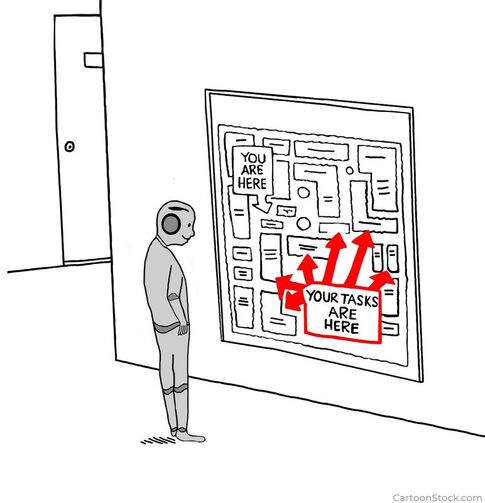|
Douglas Silas,
Specialist SEN Solicitor 29th November 2021
In this week's SEN Update, you will find sections entitled:
I know how busy everyone is, so feel free just to read the sections of interest,
or read everything; the choice is always yours.
THOUGHT OF THE WEEK
We have to be very careful sometimes to avoid talking negatively to ourselves. It is all too easy for us to see the bad in things sometimes, or be held hostage by our fears that we may not be able to do something. We all have lots of underlaying worries and we usually always default to the negative versions of things and then see the worst possible scenario, as we usually tend to inflate or exaggerate our fears. Your brain automatically thinks of the worst thing sometimes. It is like you also want to sabotage yourself unconsciously. It is like having someone inside your head constantly telling you that you cannot do something. But self-talk can be both positive or negative – it is always up to us. You cannot silence that inner negative voice completely, but you can ignore it and try to remember that it is just your fears that are talking. There is also always a difference between the message that we get from our brain and the way that we choose to respond to it. I know that this is something that is often quite hard for us to do naturally, as we frequently grow up and become increasingly cynical over many years, perhaps as an unconscious self-defence mechanism. However, we can also choose the opposite way to look at things if we really try to. For example, we often hear people referring to themselves or others as a ‘pessimist’ or an ‘optimist’ and seeing a glass as ‘half-empty’ or ‘half-full’. Some people even like to try to say that they are not one of these, but instead are really a ‘realist’ or a ‘pragmatist’, but this often sounds to me like a pessimist talking! Another example is the: “What if?” questions, which are usually quite negative and are just the pessimist inside of you talking and asking: “What if this or that happens and things turn out for the bad?” But you can actually flip this question around most of the time and instead ask yourself something like, “What if this or that turns out to be for the good and not for the bad?” Imagine it is like in a fairytale or children’s story and you have to make yourself resist going down the bad path, which only leads you to bad things and instead choose the good path, which only leads you to good things and which eventually takes you to the enchanted castle at the end! The irony is that we usually laugh at characters in films or on TV with negative emotions and outlooks on life, such as Eeyore, from Winnie The Pooh, or Marvin the Paranoid Android, from The Hitchhikers Guide to the Galaxy (I am sure you can think of many more characters like this). If that person were outside of you who was constantly saying negative things, you would simply laugh at them and ignore them. Yet, because it is your own voice telling you something inside your own head, you tend to give it more credibility and take it more seriously. You must not dwell on things and let them take over your thoughts. You also have to often let go of things and move on. For example, you find that, sometimes, your brain just seems to go back unconsciously to some of the worst things in your life from many years ago, which has nothing to do with what you are doing at the time. So, this week, if you hear that little voice inside yourself talking negatively and saying that you cannot do something, try to ignore it if you can and realise that it is just your unconscious fears probably talking to you and do not let it control what you do!
NEWS ONLINE
In terms of news, here are the articles that I found of interest this week: Covid jab wait for 12- to 15-year-olds in England could be up to five months Councils in England report 34% rise in elective home education Covid: Schools asked to test on-site after Christmas
SEN NEWS
Again, aside from clicking on the relevant links for more information, I would also remind you of the very useful resources and information provided on the following websites: - IPSEA - Council for Disabled Children - Special Needs Jungle I would also highlight again the magazines: SEN Magazine and Autism Eye which are both very helpful to any parents or professionals involved with children/young people with SEN. Keep safe until next week. With best wishes Douglas
P.S. Don’t forget, to ensure that you never miss one, you can get my SEN Updates personally by completing your email details above, or by following me on one of the social media platforms I use (i.e. Twitter/Facebook).
P.P.S. You can also share this SEN Update with others (please only do so if it may be relevant to them) by using one of the icons, usually to the right or at the bottom of this page.ere to edit.
How useful do you find my SEN Updates?
Created with Quiz Maker
Douglas Silas,
Specialist SEN Solicitor 22nd November 2021
You have to remind yourself to take a break sometimes, if you want to solve a problem properly.
In order to solve a problem, you often need to be not actively be thinking about it in the first place. If you do this, your brain will then suddenly (almost miraculously) and unconsciously solve the problem for you without you asking! Some people call this background thinking because your thinking takes place in the background, rather than in the foreground. Also, the more you think about a solution to a problem, the more the solution will usually run away from you. The irony of this is that the less then you think about a solution, the more likely you are to come up with a solution to the problem! The trick is to also do something quickly, because the more time you spend on something, the more difficult it is going to be to come up with a quick and simple solution. Remember, simplicity is the key as the more complex your problem, the simpler the answer is. The key to doing this successfully is also to either be doing something different, or actually be somewhere different. It is not just about a different way of being mentally, it is also about a different way of being physically. For example, many people do their best thinking when they are in the shower, sitting in the garden or on the sofa, or just taking a walk or going to the park. Unfortunately, you often feel chained to your desk or workplace and can be reluctant to leave it, because it feels as though you will then not be doing your work. But you actually get your best ideas about work when you are not at your desk or in your normal workplace. Even just getting up from your desk and going to the bathroom, or going for a coffee break, sometimes helps you to solve a problem that you were trying so hard to solve at your desk. The funny thing is that also, if you are sitting at a desk in front of a computer, you will often get distracted by so many things that you can do, so you then often find it hard to do the one thing that you are supposed to do! In this example, you may wish to take your phone, tablet, or laptop, and go and sit in the garden or on the sofa. There is an irony here, as many people trying to solve a complex problem, often feel that they need to get away for a weekend or even a holiday, just to think about it properly and solve it, but they then often think of the solution to the problem quite easily on their way to their destination, so that they have already solved their problem by the time that they get there! There is also another irony here because you often need to think of solutions to problems when you are under time pressures and then, paradoxically, will feel guilty and not feel that you have the time to take a break, because you will then not be spending time focusing on that problem. Yet, it is actually taking that break that will help you solve the problem in much less time. So you need to let yourself have that break, even if you feel that you cannot spare that time, as you need to think of that time as a necessary part of the work you have to do to come up with a solution to the problem. So, this week, try taking a break when you are getting stuck on a problem and looking for a solution. You will be amazed at how doing this so often helps you to then more easily come up with a solution to that problem, as I have described above.
In terms of news, here are the articles that I found of interest this week:
Ofsted inspections for all England's schools and colleges Plan to speed up Ofsted inspections of schools in England sparks fury School uniform costs: 'It amazes me how much I spend on my children'
Again, aside from clicking on the relevant links for more information, I would also remind you of the very useful resources and information provided on the following websites:
- IPSEA - Council for Disabled Children - Special Needs Jungle I would also highlight again the magazines: SEN Magazine and Autism Eye which are both very helpful to any parents or professionals involved with children/young people with SEN. Keep safe until next week. With best wishes Douglas
P.S. Don’t forget, to ensure that you never miss one, you can get my SEN Updates personally by completing your email details above, or by following me on one of the social media platforms I use (i.e. Twitter/Facebook).
P.P.S. You can also share this SEN Update with others (please only do so if it may be relevant to them) by using one of the icons, usually to the right or at the bottom of this page.
How useful do you find my SEN Updates?
Created with Quiz Maker
Douglas Silas,
Specialist SEN Solicitor 15th November 2021
You usually have to find things out for yourself I’m afraid, through a process of trial and error.
Although you can sometimes learn from other people, your true learning usually only takes place when you experience something for yourself. Learning is also generally through repetition. The trick here is to always learn from any mistakes the first time around, if possible, and then try to never make the same mistakes again (or never to make the same mistakes in the same way again). However, mistakes (within reason) are often actually good for you, as that is how we often learn. Also, accept situations for what they are and not what you want them to be. You usually never get it right the first time you try something. So, try to remember that you usually only get something right in the end, by getting it wrong a few times at first. However, be willing to try it again, knowing that, although it may not have worked out for you the first time you tried it, you will get better at it each time that you try it and should then succeed in the end, if you do not give up. People like to recall how Thomas Edison, who only invented the light bulb on his 10,000th attempt, later said: “I have not failed 10,000 times, I’ve just successfully found 9,999 ways that will not work!” There is also a real and significant difference between having high expectations and having high aspirations. It is alright to have high aspirations and really go for something, but you always have to manage your own (and other people's) expectations and be prepared to get something wrong. If you have a high expectation that something will work out for you the first time that you try it, you may soon find out that this is often unrealistic and you then will feel probably even more disappointed with the result, even if it was only slightly off what you had hoped for. It may even be serendipity in hindsight that something did not go the way that you wanted the first time, as something better was waiting for you around the corner. As people say: “Be careful what you wish for.” You can only see things through your own eyes anyway and not through other people's eyes. Remember, not everyone is like you or thinks like you. You therefore have to find out what works for you through trial and error, as what works for one person does not always work for another person and just because something works for somebody else, doesn't mean that it will work for you. You also often need to experiment with doing new things in different ways, until you eventually find what really works for you. There is no simple or single solution to things, as there are so many different ways of doing things. Also, not everyone can do everything, so just try to be the best version of yourself, rather than trying to be somebody else. At least, try to be a better version of yourself, if you can. In fact, just aim to get 1% better every day! Also, if you do start comparing yourself with others, you will again feel disappointed, as there will always be other people who are better than you at something. Finally, try to quickly accept situations for what they are and not what you want them to be. Realise that some days will be good, but some days will be bad. You just have to just hope that the good outweighs the bad, or try to and bring the bad day to a close and get rid of it and then try and make the next day a good day! So, this week, just try to realise that things do not usually work out the first time for you and be willing to try again. Remember, you're also just human!
In this week's SEN Update, you will find sections entitled:
I know how busy everyone is, so feel free just to read the sections of interest,
or read everything; the choice is always yours.
SEN NEWS
I received another email this week from the SEND Division at the Department for Education (DfE), pointing me to an open letter by Will Quince MP, Minister for Children and Families, about the long delayed SEND Review, which stated: "...I want to assure you that I am wholeheartedly committed to the SEND Review. It is vital work and as we move towards publication of our proposals in the coming months, it is key that your children, families, teachers and others who play a vital role are actively involved. ... As parents and carers of children with SEND, you are seeking change to the system so that your children get support earlier and outcomes improve alongside better access to jobs and services. I am committed to delivering the SEND Review quickly but we do need to make sure our proposed changes are robust. The Review has been delayed, in part due to the pandemic which has intensified some of the issues in the system, and we have needed time to reflect on those. We also wanted to do justice to the huge amount of input we have received and take time to check back with people that we had properly understood what they were telling us. I agree improvements are needed – and overdue. To help us move forward and enable us to publish proposals in the first quarter of 2022, we have established a steering group that brings together government departments with representatives of parents, schools, colleges and early years, local government, health and care and independent experts. You can find out more about the steering group here: www.gov.uk/government/groups/send-review-steering-group. We will of course continue to work with a wider range of organisations to hear further from young people, parents and those who work with them so they can inform and challenge our thinking. We still have work to do on the Review and I do not think it is helpful to offer up specific details ahead of publication of the full set of proposals. I think it would be more helpful for people to see them all together, so that they can make an informed judgement about whether they will lead to the lasting changes we all want to see. What I can say at this point is that, based on what we have heard and the evidence we have gathered, we know that it is important that proposals offer a way forward to reduce local variation. We also need to improve early intervention, make clearer the support and services everyone should be able to expect and have funding and accountability systems in place which support this. Improving complex systems is challenging and our proposals must align with other improvement work currently underway, such as the Care Review, recovery planning and wider reform. And we need to make sure changes we propose are supported and understood across health and care services, as well as education providers. As an indication of this government’s continued commitment to supporting the most disadvantaged children and young people, I was delighted that the recent budget announcement committed £2.6 billion over the next three years for school places for children and young people with SEND, more than tripling current capital funding levels to over £900 million by 2024-25. The Spending Review also delivers an additional £4.7bn for the core schools budget by 2024-25. This settlement includes an additional £1.6bn for schools and high needs in 2022-23, on top of the funding we previously announced. We will confirm in due course how this additional funding for 2022-23, and for the two subsequent years, will be allocated for schools and high needs. This is a hugely positive outcome. Over the coming months, I will be making more visits and listening to children, young people and their parents and school, college and local authority staff, as well as meeting with SEND organisations and experts, across education, health and care. Their views will influence the proposals we set out in a full public consultation. I strongly encourage people to get involved in that consultation. Your views really matter. I don’t underestimate the challenge we face. But continuing to listen, and working together, gives us the best chance to make sure all children and young people get the educational experience they deserve. Will Quince MP Parliamentary Under-Secretary of State for Children and Families"
NEWS ONLINE
In terms of other news, here are the articles that I found of interest this week: GCSE and A-level changes give pupils advance warning of exam content MoJ is wrong on the SEND Tribunal ‘That will save lives’: the move beyond school food allergy bans
USEFUL INFORMATION
Again, aside from clicking on the relevant links for more information, I would also remind you of the very useful resources and information provided on the following websites: - IPSEA - Council for Disabled Children - Special Needs Jungle I would also highlight again the magazines: SEN Magazine and Autism Eye which are both very helpful to any parents or professionals involved with children/young people with SEN. Keep safe until next week. With best wishes Douglas
P.S. Don’t forget, to ensure that you never miss one, you can get my SEN Updates personally by completing your email details above, or by following me on one of the social media platforms I use (i.e. Twitter/Facebook).
P.P.S. You can also share this SEN Update with others (please only do so if it may be relevant to them) by using one of the icons, usually to the right or at the bottom of this page.
How useful do you find my SEN Updates?
Created with Quiz Maker
Douglas Silas,
Specialist SEN Solicitor 8th November 2021
In this week's SEN Update, you will find sections entitled:
I know how busy everyone is, so feel free just to read the sections of interest,
or read everything; the choice is always yours.
,JUST A THOUGHT
Unfortunately, we often prioritise getting something done perfectly, as being more important than doing it completely. There is a big difference though between finishing off something to your satisfaction and finishing it off to somebody else’s satisfaction. But we are often perfectionists, so should try and remember that good enough is sometimes good enough. It can sometimes be a bit of a slog to get to the finishing point of something, so you need to make it as easy as possible for yourself to complete something and not put friction points in your own way. Usually, you find that some tasks naturally link to other tasks, so if you find a task to do that is not linked to something else, you can sometimes think about giving that task up. Additionally, you have to be careful of not unconsciously abandoning tasks or projects without realising it. It is very important to complete something at the time if you can because, if you do not, things often go stale when you don’t finish them there and then. Remember, you need to be realistic about timescales, since you always need a bit longer than you think to do things. So, recognise that the first 80% of a task usually takes you 20% of the time, but the last 20% usually takes you 80% of the time. Also, when you realise that there is still quite a lot to do to complete a task, it can actually be quite demotivating, so always feel proud of yourself for completing something and try and reward yourself, say, by eating some chocolate or something else you like, or doing something else you like doing. It doesn’t have to be a big thing, like breaking open a bottle of something! Whilst it is very important though to enjoy your success, it is also important to then move on, as otherwise you can get stuck in a rut without realising it. It is all about how you define what is critical to something, as there is always a bit of fluidity between what you think needs to be done to complete something and what actually needs to be done to complete it. Sometimes things are non-negotiable and need to be done in a certain way or by a certain time, but many things are really complete just when you feel that they are complete. So, try to review things, or adapt and sacrifice them as you go along. You also need to do a sanity check on yourself from time to time, to make sure that you can do what you think you are going to do within the allocated timeframe. In fact, it is better sometimes to start at the end of the project and work backwards, in order to plan out what you need to do for something to be completed, which I know probably sounds a bit strange but, as I heard someone once say, you need to start with the end in mind! There is also an irony that I have noticed with parents and children. Parents usually want to make things easier for their children when they do not finish tasks, so sometimes finish off the tasks for them. But actually this is not helping their children in the long-run, as it is just showing them that there is no need for them to complete tasks, or finish what they started, as somebody else will do it for them! So this week, as we are now getting close to the end of the year, try to recognise the importance of this principle of completing something. Thankfully, we still have a couple of months to go and so can give ourselves a last push to complete things that we said we would do this year. If we manage this, we will go into the new year feeling good about ourselves, rather than beating ourselves up about not completing something by the end of the year, as we may have told ourselves!
NEWS ONLINE
In terms of news, here are the articles that I found of interest this week: Covid infections dip among secondary schoolchildren in England Research and analysis - Review of time in school and 16 to 19 settings Bill to prevent school shutdowns passes first test
SEN NEWS
Again, aside from clicking on the relevant links for more information, I would also remind you of the very useful resources and information provided on the following websites: - IPSEA - Council for Disabled Children - Special Needs Jungle I would also highlight again the magazines: SEN Magazine and Autism Eye which are both very helpful to any parents or professionals involved with children/young people with SEN. Keep safe until next week. With best wishes Douglas
P.S. Don’t forget, to ensure that you never miss one, you can get my SEN Updates personally by completing your email details above, or by following me on one of the social media platforms I use (i.e. Twitter/Facebook).
P.P.S. You can also share this SEN Update with others (please only do so if it may be relevant to them) by using one of the icons, usually to the right or at the bottom of this page.ere to edit.
How useful do you find my SEN Updates?
Created with Quiz Maker
Douglas Silas,
Specialist SEN Solicitor 1st November 2021
Today, I want to talk about the importance of always leaving yourself a margin of error of time for things that you plan to do and also learning to say "no" to things sometimes (as they are related, believe it or not!).
Unfortunately, we have grown up in a society where being busy and not having enough time to do things is often seen as a badge of honour and something to boast about. But being busy and not having enough time to do things you want to do is not something to be proud of and should always be avoided, if at all possible. In fact, you should actually be more proud of the fact that you have time to do the things that you want to do, instead of saying that you cannot do things that you want to do, just because you are too busy! By not leaving yourself more time than you need to do things, you are effectively not leaving yourself any margin of error over time to allow you to breathe and not always feel so hurried. This will end up making you more busy and feeling more stressed than you want to. I always like to say that there is a difference between ‘stress’ and ‘pressure’, as pressure is often quite good and is something that you put on yourself that motivates you, makes you want to do something well and is in your control. But stress is when other people put you under pressure and it is therefore out of your control and often demotivating. The irony therefore of not leaving yourself any time margin is that you are now not just putting yourself under pressure, but you are actually now also putting yourself under stress! Not having enough time to do something is often because you are trying to do too many things within a short period of time and are therefore not being realistic with yourself. You usually have to just step back and look at things more realistically. One of the things that I’ve also noticed over the years is that, to avoid this from happening, you often need to accustom yourself to start saying “no” to requests from other people (or even yourself) when asked to do things sometimes – i.e. not always feeling that you should say “yes” to everything you are asked to (or can) do. It’s best summarised in the old adage: “Just because you can do something, doesn’t mean that you should do it!” Ending up doing things that you do not really want to do, but are committed to, or not having enough time to do the things that you want to do, will just consciously or unconsciously make you feel sad and frustrated. Also, everything adds up, so, if you always agree to things and accustom yourself to always say “yes” to everything that you are asked to do (externally or internally), then you will eventually not have enough time left to do the things that you really want to do. I know that this is very hard to do from personal experience, but the more you do it, the better you will become at it. So, this week, try to say “no” as much as possible to other people (or even yourself) who ask you to do something, but which you do not really want to do, and also try to leave yourself a margin of error of time when planning to do something. Or, even if you want to do something, but you then realise that, practically, you will probably not be able to do it within the time allocated, also try to say “no” to it. As I say, it will become easier the more that you do it!
In this week's SEN Update, you will find sections entitled:
I know how busy everyone always is, so please feel free just to read the sections that are of interest to you or read everything; the choice is always yours.
SEN NEWS
A lot of SEN news this week was focused on the Budget and the announcements of reports that it will include £2.6 billion to help children with special educational needs and disabilities and £1.8bn to help schools and colleges tackle lost learning from the pandemic, and bring total education recovery support to almost £5bn. As ever, there were supporters and critics of these announcements, particularly a concern that the SEND money was for 'capital' investment (i.e. buildings and similar), rather than 'revenue' funding (i.e. practical everyday and ongoing support).
NEWS ONLINE
In terms of news, here are the other articles that I found of interest this week: Budget 2021: Schools cash to be restored to 2010 levels after 10 years of cuts Rishi Sunak’s learning catch-up fund is ‘false economy’, says former schools tsar Disadvantaged pupils in England lag behind in Covid learning catch-up
USEFUL INFORMATION
Again, aside from clicking on the relevant links for more information, I would also remind you of the very useful resources and information provided on the following websites: - IPSEA - Council for Disabled Children - Special Needs Jungle I would also highlight again the magazines: SEN Magazine and Autism Eye which are both very helpful to any parents or professionals involved with children/young people with SEN. Keep safe until next week. With best wishes Douglas
P.S. Don’t forget, to ensure that you never miss one, you can get my SEN Updates personally by completing your email details above, or by following me on one of the social media platforms I use (i.e. Twitter/Facebook).
P.P.S. You can also share this SEN Update with others (please only do so if it may be relevant to them) by using one of the icons, usually to the right or at the bottom of this page.
How useful do you find my SEN Updates?
Created with Quiz Maker
|
Archive
March 2022
|
© Douglas Silas Solicitors 2005-24
Authorised and Regulated by the Solicitors Regulation Authority (SRA no: 643718)
‘Douglas Silas Solicitors’ is the trading name of ‘Douglas Silas Solicitors Limited’, a limited company registered in England & Wales (company no: 10689991), whose registered office is Gable House, 239 Regents Park Road, Finchley, London, United Kingdom, N3 3LF. A list of members/directors may be inspected at our office.
Authorised and Regulated by the Solicitors Regulation Authority (SRA no: 643718)
‘Douglas Silas Solicitors’ is the trading name of ‘Douglas Silas Solicitors Limited’, a limited company registered in England & Wales (company no: 10689991), whose registered office is Gable House, 239 Regents Park Road, Finchley, London, United Kingdom, N3 3LF. A list of members/directors may be inspected at our office.





















 RSS Feed
RSS Feed







